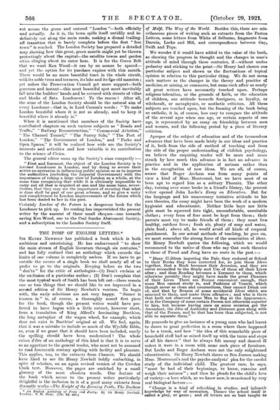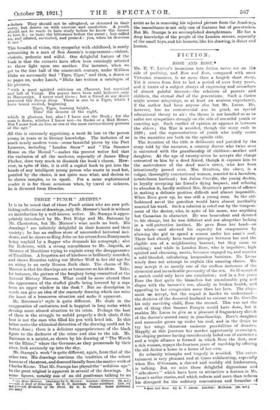THE POMP OF ENGLISH LETTERS.*
Szs HENny l!•;Ewnora has published a book which is both ambitious and entertaining. He has endeavoured " to show the main stream of English literature through six centuries," and has fully realized that an anthology which exceeds the limits of one volume is completely useless. If we have to go outside the covers of a single book we shall nearly all of us prefer to go to the originals. Keeping before us the two " don'ts " for the critic of anthologies—(l) Don't exclaim at the exclusion of a particular author ; (2) Don't complain that the most typieal work of Smith has been left out—there remain one or two things that we should like to see improved in a second edition of Sir Henry Newbolt's venture. To begin with, the early selections are not very happy. " Sumer is icumen in " is, of course, a thoroughly sound first piece for the book, though the present writer would have pre- ferred to have begun with a little extract, however short, from a translation of King Alfred's fascinating Boethius, the long metaphor of the wagon wheel, for example, which does not exist in Boethius' original at all. We feel, again, that it was a mistake to include so much of the Wycliffe Bible, or, even if we grant that it should have been included, surely the spelling should have been modernized ? The whole raison d'être of an anthology of this kind is that it is to serve as an appetizer to the general reader, who must not be assumed to read fourteenth century spelling with facility and pleasure. This applies, too, to the extracts from Chaucer. We should have liked to see Sir Henry Newbolt boldly embarking, in spite of scholars, on an again revised version of the Cowden Clark text. However, the pages are enriched by a small glossary of the most obsolete words. One feature of the book which seems to the present writer particularly delightful is the inclusion in it of a good many extracts from dramatic works—The Knight of the Burning Pestle, The. Duchess • An English Anthology of Prose and Poetry. Sir henry Newbolt. London: J. M. Dent. [103. tRI. net.] of Malfi, The Way of the World. Besides this, there are mis- cellaneous pieces of writing such as extracts from the Poston Letters, some letters from White of Selborne, fragments from Darwin, Locke and Mill, and correspondence between Gay,
Swift and Pope.
We wonder if it would have added to the value of the book, as showing the progress in thought and the changes in man's attitude of mind through these centuries, if—without undue pedantry and sticking to the point—Sir Henry had chosen one particular subject and shown us the fluctuations of topical opinion in relation to this particular thing. We do not mean
such matters as the changes in the theory and practice o medicine, or mining, or commerce, but some such affair as nearly all great writers have necessarily touched upon. Perhaps religious toleration, or the grounds of faith, or the education of children, our attitude towards foreigners, or loyalty, or witchcraft, or metaphysics, or aesthetic criticism. All these subjects are touched upon, but the framing of the book being so catholic, it is, of course, less easy to compare the attitude of the several ages when one age, or certain aspects of one age, is represented by an essay on friendship between men and women, and the following period by a piece of literary criticism.
Apropos of the subject of education and of the tremendous advances that have been made lately in our ideas and practice of it, both from the side of method of teaching and from
the side of the proper understanding of childish psychology, we believe the enquiring reader will be more and more struck by how much this advance is in fact an advance in practice and in the application of notions rather than in the excogitation of new ideas. We are all, of course, aware that Roger Ascham was from many points of view a kind of line. Montessori, but we have most of us been apt to regard him as a solitary Phoenix. The other day, turning over some books in a friend's library, the present writer opened John Locke's Essay on Education. But for
the language and his unnecessary tentative attitude to his own theories, the essay might have been the work of a modern hygienist and educationist. Neither little boys nor little girls must be squeezed into tight, uncomfortable, unsuitable clothes ; every form of fear must be kept from them ; their parents must try to make friends of them ; they must live healthy, outdoor lives ; fresh air, plenty of soap and water, plain food ; above all, he would avoid all kinds of corporal punishment. In our actual methods of teaching, he goes on, we must remember the strong force of the association of ideas. Sir Henry Newbolt quotes the following, which we would recommend to the notice of those who say that such theories as those of Freud and Jung have no roots in the past :-
" Many CLildren imputing the Pain they endured at School to their Books they were corrected for, so join those Ideas together, that a Book becomes their Aversion, and they are never reconciled to the Study and Use of them all their Lives after ; and thus: Reading becomes a Torment to them, which otherwise possibly they might have made the great Pleasure of their Lives. There are Rooms convenient enough, that some Mon cannot study in, and Fashions of Vessels, which though never so clean and commodious, they cannot Drink out of, and that by Reason of some accidental Ideas which are annexed to them, and make them offensive ; and who is there that hath not observed some Man to flag at the Appearance, or in the Company of some certain Person not otherwise superior to him, but because having once on some occasion got the Ascendant, the Idea of Authority and Distance goes along. with that of the Person, and he that has been thus subjected, is not able to separate them."
He proceeds to give an instance of a young man who had learnt to dance to great perfection in a room where there happened to be a trunk, and how " the idea of this remarkable piece of household stuff had so mixed itself up with the turns and steps of all his dances " that he always felt uneasy and danced ill unless it were in a room with some such piece of furniture.
But Locke and Roger Ascham were not the only enlightened educationists. Sir Henry Newbolt shows us Ben Jonson making Mme. Montessori's and the psycho-analysts' plea for the careful study of the individual child. The greatest care, he says, "must be had of their beginnings, to know, examine and weigh their natures" ; and then he pleads for the child's love of variety—a love which, as we know now, is occasioned by very real biological factors :—
" Change is a kind of refreshing in studies, and" infuseth knowledge by way of recreation. Thence the school itself is called a play, or game ; and all letters are so best taught to scholars. They should not be affrighted, or deterred in their entry, but drawn on with exercise and emulation. A youth should not be made to hate study before he know the causes to love it - or taste the .bitterness before the sweet ; but called en, and allured, entreated, and praised : yea, when he deserves it not."
This breadth of vision, this sympathy with ohildhood, is surely astonishing in a man of Ben Jonson's temperament—violent, choleric, pedantic and wilful. One delightful feature of the book is that the extracts have often been cunningly selected to throw light upon one another. For instance, when we get to the first half of the nineteenth century, under William Blake we necessarily find "Tiger, Tiger," and then, a dozen or so pages on, under Lamb, "Blake has written a catalogue of his pictures,
" with a most spirited criticism on Chaucer, but mystical and full of Vision. His poems have been sold hitherto only in Manuscript. I never read them ; but a friend at my desire procured the Sweep Song. There is one to a Tiger, which I have heard recited, beginning
Tiger, Tiger, burning bright, Thro' the deserts of the night, which is glorious, but, alas ! I have not the Book ; for the man is flown, whither I know not—to Hades or a Mad House. But I must look on him as one of the most extraordinary persons of the age."
All this is extremely appetizing, a most fit lure to the person young in years or in literary knowledge. The inclusion of so much nearly modern verse—some beautiful pieces by the Poet Laureate, including " London Snow " and " The Summer House on the Mound "—makes the present writer feel that the exclusion of all the moderns, especially of James Elroy Fiedler, does very much to diminish the book's charm. How- ever, in spite of this, it is still a capital book to put into the hands of any intelligent young person who wants to read but, puzzled by the choice, is not quite sure what, and desires to be shown samples, so to speak. For a more sophisticated reader it is for those occasions when, by travel or sickness, he is divorced from libraries.







































 Previous page
Previous page